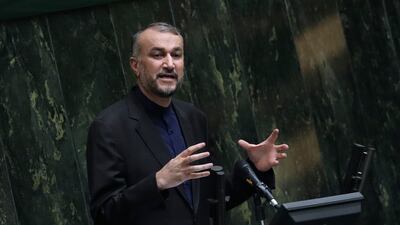Iran will open direct talks with the United States if current nuclear talks in Vienna reached a point that they're needed, Iran's foreign minister said for the first time on Monday.
“If we reach a point in the negotiation process where a good agreement requires a dialogue with the United States, we will not ignore it,” Hossein Amirabdollahian said.
The US and Iran have been having indirect talks over the past year since President Biden took office to revive the 2015 nuclear accord known as the Joint Comprehensive Plan of Action (JCPOA).
While US negotiations indicated they would be open to direct talks, with US special envoy to Iran Rob Malley and other officials saying the US would welcome the move, Iran had been largely closed off to the suggestion until Monday.
"We have long held the position that it would be more productive to engage with Iran directly, on both JCPOA negotiations and other issues," US State Department Spokesman Ned Price said.
"Given the pace of Iran's nuclear advances, we are almost out of time to reach an understanding on mutual return to full implementation of the JCPOA."
Iran said the US must "change course" and return to the nuclear deal, prior to any direct talks.
'Negotiating with the enemy is another thing'
Iran's supreme leader Ayatollah Ali Khamenei, who has the final say on major issues including the nuclear policy, said negotiating with the "enemy" does not mean surrendering.
"The bullying of the enemy should not be tolerated," he said, referring to the US.
But Mr Khamenei did leave open the possibility of speaking with the US in his speech, when he said: "Negotiating with the enemy some time, for example, is another thing – us interacting with them is another thing."
While progress has been slow in Vienna, both sides have been expressing cautious optimism over potential headway. On Monday, the US allowed South Korea to pay Iran's United Nations dues using frozen Iranian assets. The gesture was seen largely as a goodwill decision by the Biden administration. Iran has billions of dollars of assets frozen in South Korea due to sanctions.
The potential for the deal seems to have also increased with the departure of Richard Nephew, the deputy special envoy to Iran. Mr Nephew was one of the key architects of the Obama era sanctions regime on Iran. He had largely advocated for a harsher stance towards Iran at the Vienna talks.










